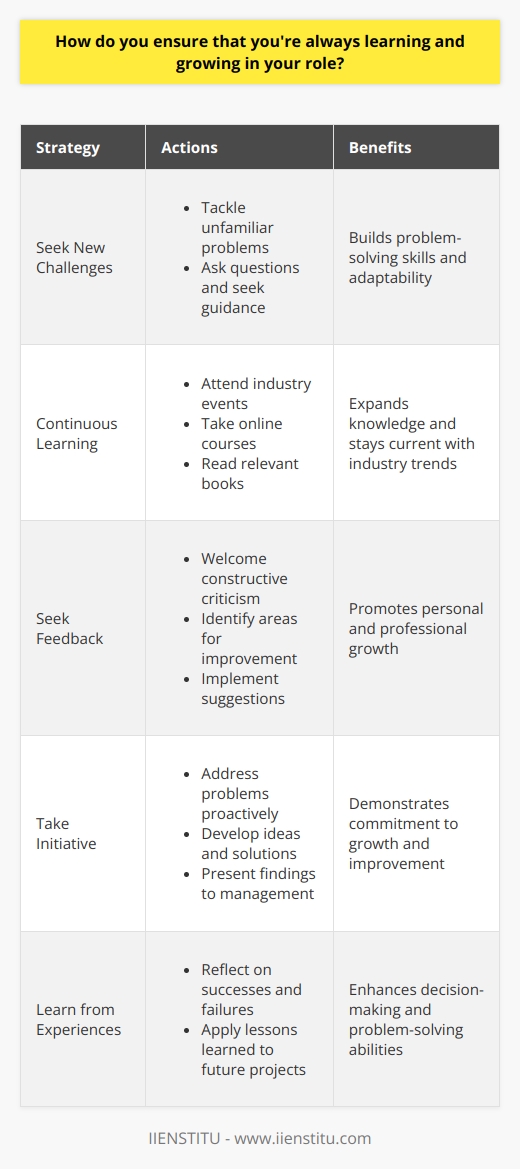
As someone who has navigated the professional world for over a decade, I've come to realize the profound importance of effective time management. It's a skill that can make or break your career, and one that I've spent countless hours honing. But here's the thing: time management isn't a one-and-done deal. It's an ongoing process that requires regular reassessment and adjustment. And that's precisely why interviewers often ask, "How often do you reassess your time management methods?"
When I first encountered this question during an interview, I was taken aback. I had never really given much thought to how frequently I reassessed my time management strategies. But as I mulled it over, I realized that the frequency of time management reassessment is a critical factor in maintaining productivity and efficiency.
You see, our work environments are constantly evolving. New projects come up, priorities shift, and unexpected challenges arise. If we don't regularly reassess our time management methods, we risk getting stuck in outdated routines that no longer serve us. As the renowned management theorist Peter Drucker once said, "Time is the scarcest resource and unless it is managed nothing else can be managed." (Drucker, 1967, p. 22)
So, how often should you reassess your time management methods? The answer isn't one-size-fits-all. It depends on a variety of factors, such as:
1- The nature of your work
2- The complexity of your projects
3- The frequency of changes in your responsibilities
4- Your personal preferences and work style
Personally, I've found that reassessing my time management strategies on a monthly basis works well for me. It allows me to step back, evaluate what's working and what's not, and make necessary adjustments. But I also remain flexible and open to reassessing more frequently if the situation demands it.
For example, last year I was working on a particularly complex project with tight deadlines. I quickly realized that my usual time management methods weren't cutting it. I was spending too much time on low-priority tasks and not enough on the critical ones. So, I took a step back and reassessed my approach. I:
Conducted a time audit to identify where I was spending my time
Ruthlessly prioritized my tasks based on their impact and urgency
Delegated or eliminated non-essential tasks
Broke down large tasks into smaller, manageable chunks
Used the Pomodoro Technique to maintain focus and avoid burnout
By reassessing and adjusting my time management methods, I was able to complete the project on time and to a high standard. It was a powerful reminder of the importance of regularly evaluating and refining my approach to time management.
But the benefits of reassessing your time management methods go beyond just improving productivity. It also demonstrates key qualities that employers value, such as:
Adaptability: The ability to adjust to changing circumstances and demands.
Self-awareness: The capacity to reflect on your own strengths, weaknesses, and areas for improvement.
Proactivity: The initiative to identify and solve problems before they escalate.
Continuous learning: The willingness to learn from experience and apply new knowledge to improve performance.
As the pioneering psychologist B.F. Skinner noted, "A failure is not always a mistake, it may simply be the best one can do under the circumstances. The real mistake is to stop trying." (Skinner, 1971, p. 153) By regularly reassessing your time management methods, you demonstrate a commitment to continuous improvement and growth.
Of course, reassessing your time management methods is just the first step. The real magic happens when you take action based on your insights. This might involve:
Experimenting with new time management techniques, such as time blocking or task batching
Investing in tools and technology to streamline your workflow
Seeking feedback from colleagues or mentors on areas for improvement
At what frequency do you re-evaluate your strategies for managing time?
How many times in a year do you reconsider your methods for time management?
Do you often rethink the way you manage your time?
What interval do you use to reassess your time management techniques?
When was the last time you reconsidered your approach to managing your time?
Do you frequently analyze your time management methods?
In terms of time, when do you plan to reassess your time management strategies?
Is there a regular schedule on which you reassess how you manage your time?
Does your time management evaluation happen on a consistent basis?
How regularly do you reassess the effectiveness of your time management process?
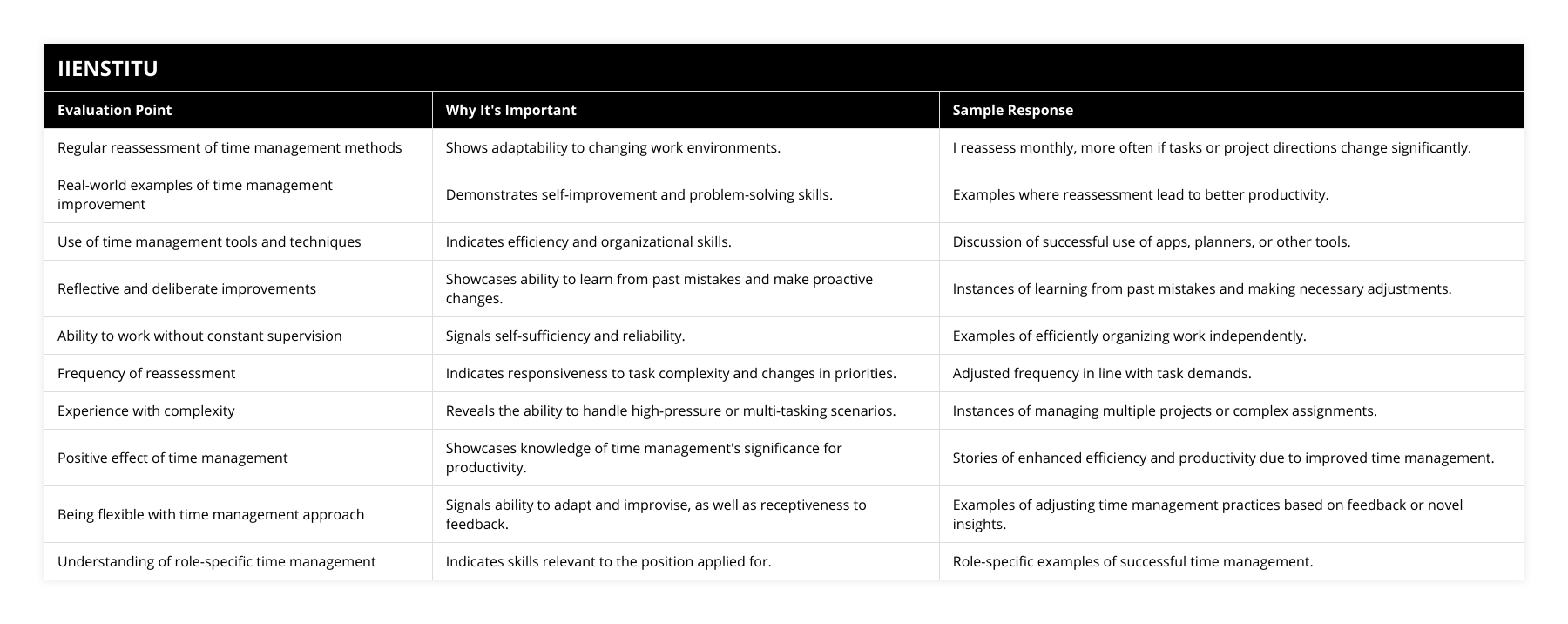
Setting clear boundaries around your time and energy
Practicing self-care to avoid burnout and maintain peak performance
As you can see, the frequency of time management reassessment is a multifaceted issue that speaks to your overall approach to work and personal development. By regularly reassessing and refining your methods, you not only improve your productivity but also demonstrate valuable qualities that can set you apart in your career.
So, the next time an interviewer asks you, "How often do you reassess your time management methods?", don't just give a generic answer. Use it as an opportunity to showcase your self-awareness, adaptability, and commitment to continuous improvement. Share specific examples of how you've reassessed and adjusted your approach in the past, and the positive outcomes that resulted.
Remember, effective time management is a journey, not a destination. By embracing the power of regular reassessment and adjustment, you can unlock your full potential and achieve your goals with greater ease and efficiency. As the philosopher William James once said, "The great use of life is to spend it for something that will outlast it." (James, 1906, p. 195) By mastering the art of time management, you can make the most of the precious time you have and leave a lasting impact on the world.
References:
Drucker, P. F. (1967). The Effective Executive. Harper & Row.
James, W. (1906). The Moral Equivalent of War. Association for International Conciliation.
Skinner, B. F. (1971). Beyond Freedom and Dignity. Knopf.
Frequently Asked Questions
How do you prioritize your tasks?
Effective Task Prioritization
When it comes to prioritizing my tasks, I always start by listing everything that needs to be done. Then, I evaluate each task based on its urgency and importance. The most critical and time-sensitive tasks are tackled first.
Assessing Urgency and Importance
I ask myself, "What are the consequences of not completing this task promptly?" If the repercussions are significant, such as missing a client deadline or delaying a project, I know it's a top priority. Additionally, I consider the value each task brings to the company's goals and objectives.
Breaking Down Complex Tasks
For larger, more complex tasks, I break them down into smaller, manageable steps. This helps me stay focused and motivated, as I can see progress being made. I set milestones and deadlines for each subtask to ensure I'm staying on track.
Staying Flexible and Adaptable
I understand that priorities can shift unexpectedly, so I remain flexible. If an urgent request comes in or a problem arises, I re-evaluate my priorities and adjust accordingly. Communication is key here - I keep my team and supervisors informed of any changes.
Continuous Review and Improvement
At the end of each day or week, I reflect on my task list and prioritization methods. I ask myself what worked well and what could be improved. By continuously refining my approach, I become more efficient and effective over time.
Ultimately, prioritizing tasks is about being strategic, adaptable, and focused on delivering the greatest value to the company. It's a skill I've developed through experience and one that I continue to hone every day.
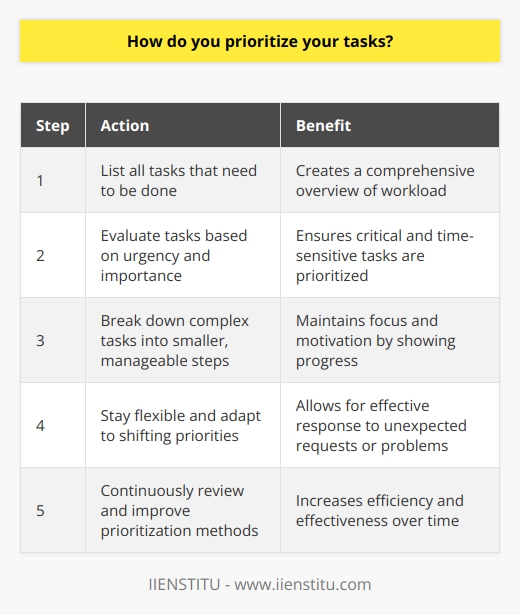
What strategies do you use to manage your time effectively?
I prioritize my tasks based on urgency and importance. This helps me focus on the most critical tasks first. I break down large projects into smaller, manageable steps. Setting realistic deadlines keeps me on track.
Utilizing Technology
I leverage productivity apps and tools to streamline my workflow. Calendar reminders and to-do lists keep me organized. Automating repetitive tasks saves time for more important work. I minimize distractions by silencing notifications when focusing.
Effective Communication
Clear communication is key to managing my time well. I ask questions upfront to understand expectations fully. Regular check-ins with my team ensure we're all aligned. I'm not afraid to delegate when appropriate.
Flexibility and Adaptability
While I plan my time carefully, I also remain flexible. Priorities can change unexpectedly, so I adapt as needed. If something urgent comes up, I reassess and adjust my schedule. Learning to pivot helps me stay productive.
Effective time management is a skill I've honed over my career. By staying organized, communicating well, and being adaptable, I'm able to consistently deliver strong results. I'm confident these strategies would enable me to thrive in this role.
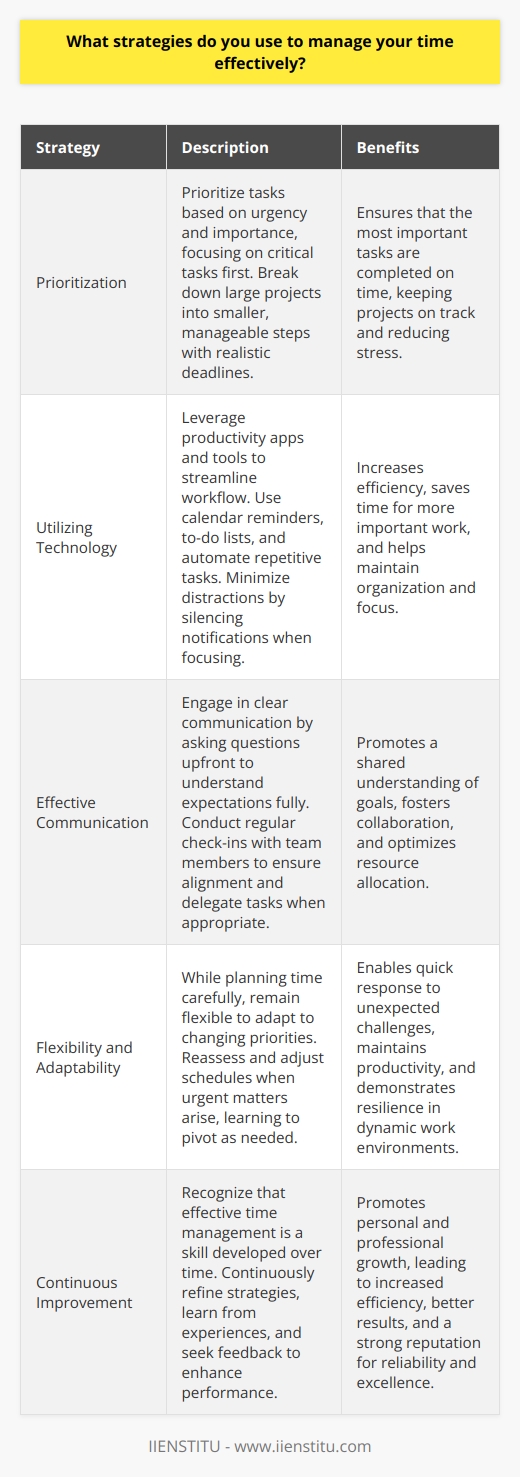
How do you handle multiple deadlines?
Prioritizing Tasks
When faced with multiple deadlines, I prioritize my tasks based on their urgency and importance. I assess which projects have the most pressing due dates and which ones will have the greatest impact on the company's goals. This helps me allocate my time and resources effectively.
Creating a Schedule
I create a detailed schedule that breaks down each project into smaller, manageable tasks. I set realistic milestones for each task and assign them specific time slots in my calendar. This allows me to stay organized and ensures that I'm making steady progress on all of my projects.
Communicating with Team Members
I believe that clear communication is key when working on multiple projects simultaneously. I keep my team members and supervisors informed about my progress and any potential roadblocks I encounter. If I need help or guidance, I don't hesitate to reach out and ask for it.
Staying Flexible
Despite my best efforts to plan and schedule, unexpected challenges can always arise. When this happens, I remain flexible and adapt my approach as needed. I'm not afraid to adjust my priorities or ask for extensions if necessary, as long as I communicate openly with everyone involved.
Maintaining Work-Life Balance
Juggling multiple deadlines can be stressful, so I make sure to take care of myself outside of work. I set aside time for hobbies, exercise, and spending time with loved ones. This helps me recharge and come back to work with a fresh perspective.
By following these strategies, I've been able to successfully handle multiple deadlines in my previous roles. I'm confident that I can bring the same level of organization, communication, and adaptability to this position.
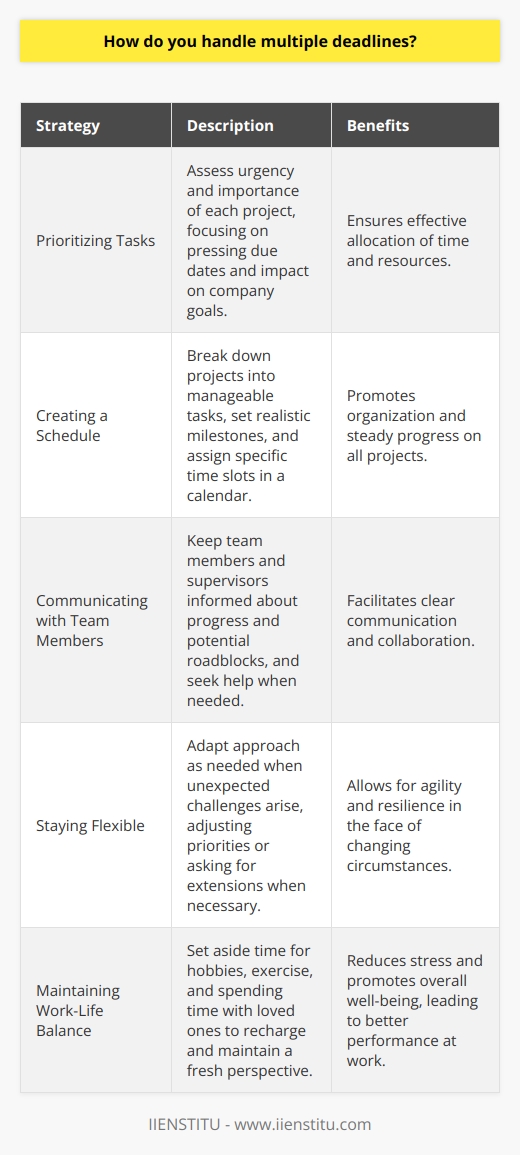
What tools or techniques do you use to stay organized?
I rely on a combination of digital tools and traditional methods to stay organized and productive:
Digital Tools
I use a task management app to create to-do lists and set reminders for important deadlines. This helps me prioritize my workload and ensures nothing slips through the cracks. For project collaboration, I'm a big fan of using shared online workspaces where team members can communicate, share files, and track progress all in one place.
Inbox Management
To keep my email inbox from becoming overwhelming, I use filters and labels to automatically sort incoming messages. I try to respond to urgent emails right away and set aside dedicated time blocks to work through the rest. Unsubscribing from irrelevant newsletters also helps minimize distractions and clutter.
Analog Methods
Call me old-fashioned, but I still love using a physical planner to map out my week and jot down notes. There's something satisfying about crossing off completed tasks with a pen! I've found that writing things down helps cement them in my memory better than just typing.
Prioritization and Focus
Beyond the specific tools, I believe the key to staying organized is ruthless prioritization. I try to focus on the most important, high-impact tasks first before getting sidetracked by minor to-dos. Regular check-ins with myself and my team help re-assess priorities and make adjustments as needed. It's an ongoing process, but these techniques help me stay on top of my responsibilities and be as productive as possible!
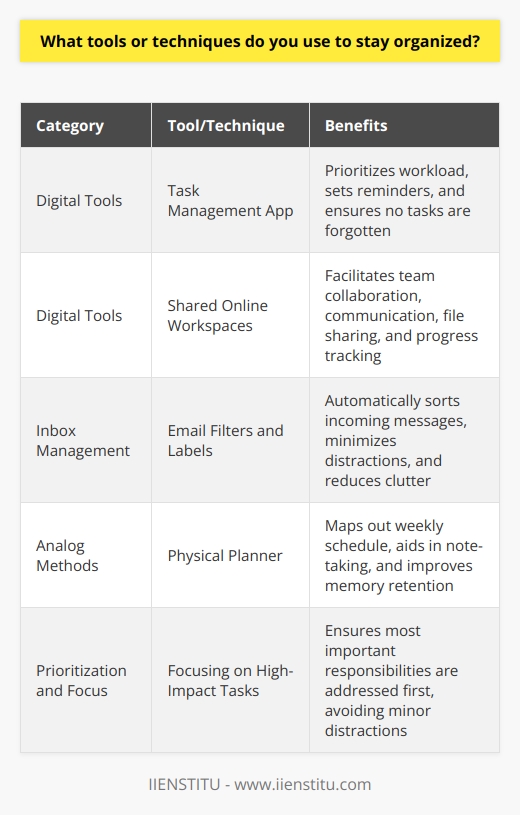
How do you ensure that you complete your work on time?
I have developed a few strategies to ensure that I complete my work on time. First and foremost, I prioritize my tasks based on their urgency and importance. This helps me focus on the most critical tasks first.
Setting Realistic Deadlines
When I receive a new project, I always take the time to assess the scope of the work and set realistic deadlines. I break down larger tasks into smaller, manageable chunks and allocate sufficient time for each step. This approach prevents me from feeling overwhelmed and allows me to stay on track.
Effective Time Management
I am a firm believer in effective time management. I use tools like calendars and to-do lists to organize my tasks and keep myself accountable. I also set aside dedicated time blocks for focused work, minimizing distractions and maximizing productivity.
Regular Communication
I maintain open lines of communication with my team members and superiors. If I encounter any challenges or roadblocks that may affect my ability to meet a deadline, I proactively reach out and discuss potential solutions. Keeping everyone informed helps manage expectations and ensures that we can work together to find the best way forward.
Flexibility and Adaptability
Despite my best efforts, unexpected issues can sometimes arise. In these situations, I remain flexible and adaptable. I quickly reassess my priorities and make necessary adjustments to my plan. By being proactive and solution-oriented, I can often find ways to still meet my deadlines, even in the face of challenges.
At the end of the day, completing work on time is about discipline, organization, and effective communication. By implementing these strategies consistently, I have built a strong track record of meeting deadlines and delivering high-quality work.
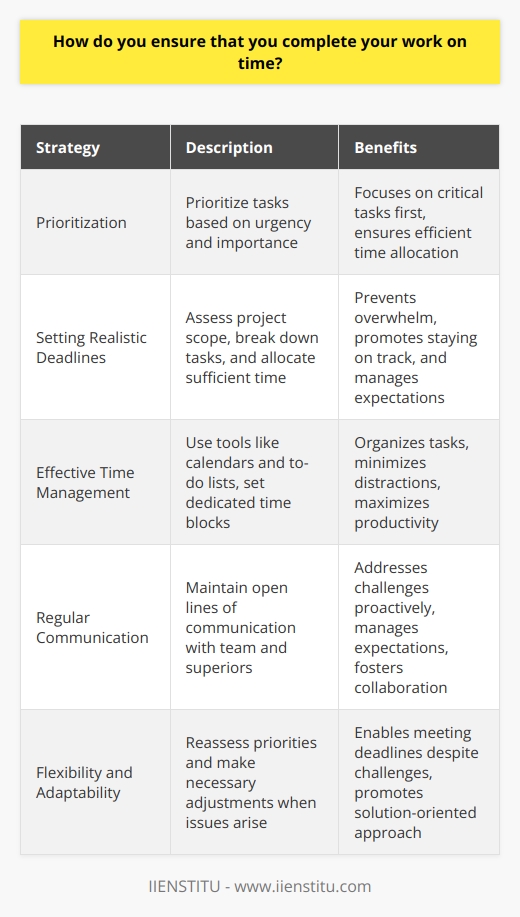
How do you deal with distractions or interruptions?
When faced with distractions or interruptions, I take a proactive approach to maintain focus and productivity.
Prioritize and Stay Organized
I keep a well-organized to-do list and prioritize tasks based on urgency and importance. This helps me quickly refocus after interruptions and ensures I'm making progress on key objectives.
For example, last week when working on a critical project, a coworker interrupted with a non-urgent question. I politely asked if we could discuss it later, explaining my current priority. By staying organized and communicating clearly, I was able to minimize the disruption.
Manage Your Environment
I try to create a work environment that minimizes distractions. This might mean finding a quiet space, wearing noise-canceling headphones, or closing unnecessary browser tabs and apps.
In my previous role, our open office layout could get quite noisy and distracting. I started using headphones and found a less busy corner to work from when I really needed to concentrate. These small changes made a big difference in my ability to focus amidst the bustle.
Take Breaks and Refocus
When interruptions do happen, I find it helpful to take a quick break to clear my head before diving back in. I might take a short walk, do some stretches, or practice a miniature meditation.
These brief mental breaks help me release frustration, regain composure, and return to the task with fresh eyes and renewed concentration. It's a technique I learned in college while juggling work, classes and extracurriculars - and I've used it ever since to manage stress and stay focused in the face of distractions.
Overall, dealing with interruptions is about controlling what you can, having strategies to refocus, and maintaining a positive, solution-oriented mindset. With practice, I've gotten better at navigating distractions while still being a collaborative, responsive team member.
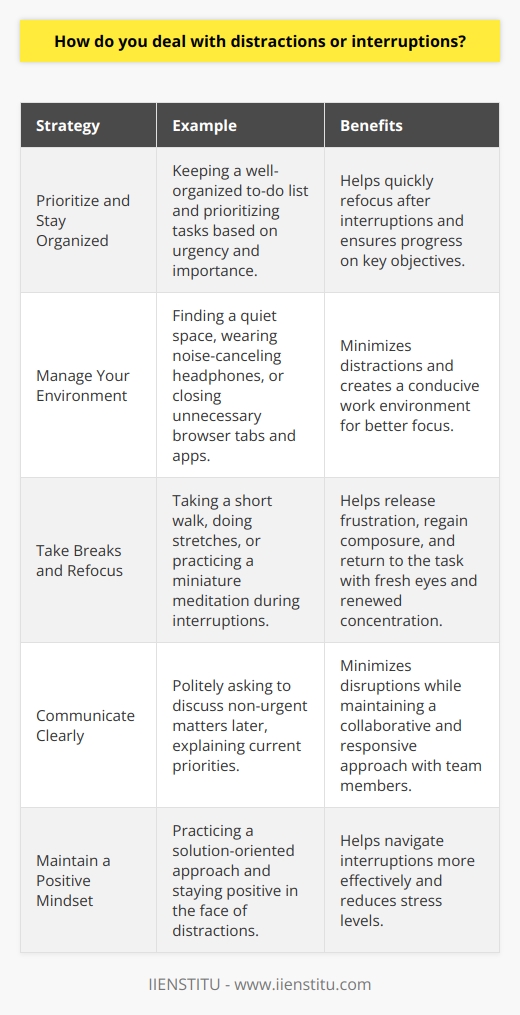
How do you balance your workload and avoid burnout?
I believe that maintaining a healthy work-life balance is essential to avoiding burnout. I prioritize my tasks based on urgency and importance, and I'm not afraid to ask for help when needed. I also make sure to take regular breaks throughout the day to recharge my batteries.
Setting Boundaries
One key strategy I use is setting clear boundaries between my work and personal life. When I'm at work, I focus solely on my job responsibilities, but when I'm off the clock, I make a conscious effort to disconnect and engage in activities that bring me joy and relaxation. This helps me come back to work feeling refreshed and ready to tackle new challenges.
Practicing Self-Care
I've learned that practicing self-care is crucial for maintaining my mental and physical well-being. I make sure to get enough sleep, eat a balanced diet, and exercise regularly. I also carve out time for hobbies and interests outside of work, like hiking or reading a good book. These activities help me reduce stress and prevent burnout.
Communicating with My Team
Another important aspect of avoiding burnout is open communication with my team and supervisors. If I'm feeling overwhelmed or struggling with a particular task, I don't hesitate to reach out for support or guidance. I believe that fostering a collaborative and supportive work environment is key to managing workload effectively and preventing burnout for everyone involved.
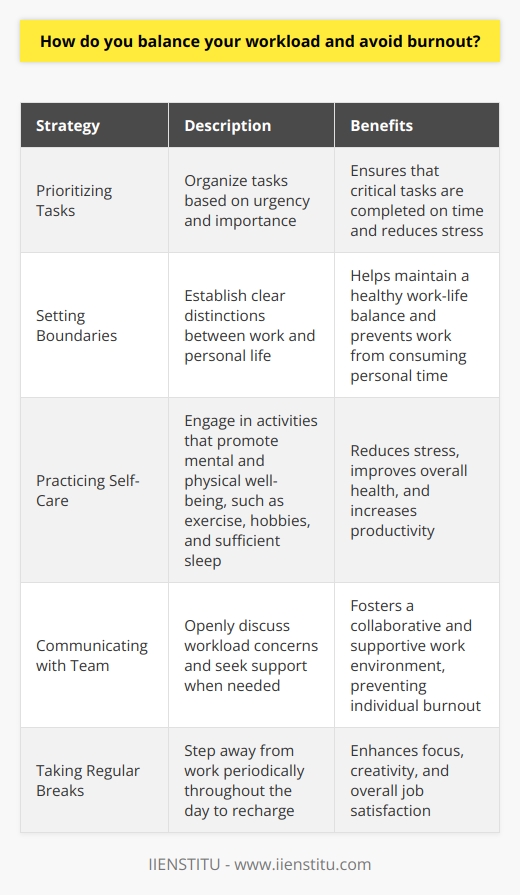
What do you do when you realize you're behind schedule?
When I realize I'm behind schedule, the first thing I do is take a deep breath and assess the situation. It's important not to panic or get overwhelmed, as that can lead to hasty decisions and mistakes.
Prioritize Tasks
I quickly review my to-do list and prioritize the most critical tasks. I ask myself, "What absolutely must get done today?" This helps me focus on the essentials and let go of less urgent matters.
Communicate with the Team
Next, I reach out to my team and let them know about the delay. I explain the reasons behind the setback and provide a realistic timeline for when I expect to catch up. Clear communication keeps everyone on the same page and prevents further misunderstandings.
Break It Down
To make the workload more manageable, I break down larger tasks into smaller, actionable steps. This makes the project feel less daunting and allows me to make steady progress, even if it's not as fast as I'd like.
Stay Positive and Focused
Throughout the process, I maintain a positive attitude and remind myself that setbacks are a normal part of any job. I stay focused on the end goal and celebrate small victories along the way. This helps me stay motivated and push through the challenges.
In the end, falling behind schedule is never ideal, but it's how we respond to these situations that truly matters. By staying calm, prioritizing, communicating, and breaking things down, I'm able to get back on track and deliver quality work, even under pressure.
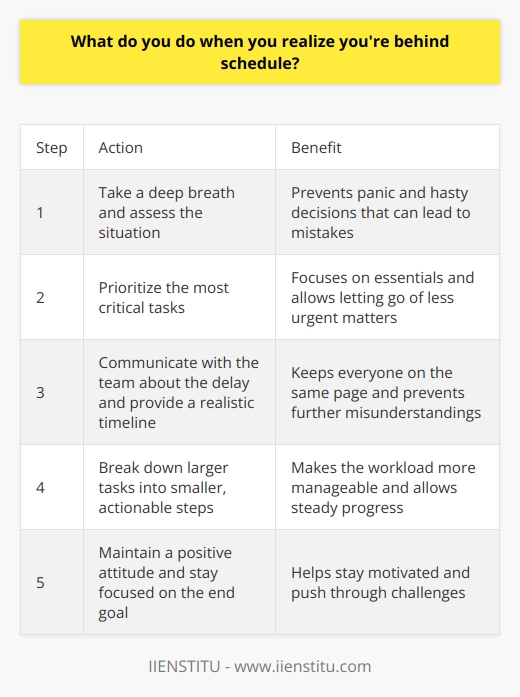
How do you adapt your time management approach to different projects?
When it comes to adapting my time management approach to different projects, I rely on a few key strategies:
Prioritize and Plan
I start by carefully reviewing the project requirements and identifying the most critical tasks. I then create a detailed plan, breaking down the project into smaller, manageable steps. This helps me stay focused and ensures that I'm always working on the most important tasks first.
Flexibility is Key
I've learned that no two projects are exactly alike, so I remain flexible in my approach. If unexpected challenges arise or priorities shift, I'm quick to adjust my plan and adapt my time management strategy accordingly. Being able to think on my feet and pivot when needed has been crucial to my success.
Collaborate and Communicate
I believe that effective collaboration and communication are essential for successful project management. I make sure to keep open lines of communication with my team members and stakeholders, regularly updating them on progress and seeking their input when needed. By fostering a collaborative environment, we can work together to overcome obstacles and deliver exceptional results.
Continuously Improve
Finally, I'm always looking for ways to improve my time management skills. After each project, I take time to reflect on what worked well and what could be improved. By learning from my experiences and seeking out new tools and techniques, I'm able to continuously refine my approach and deliver better results with each new project.
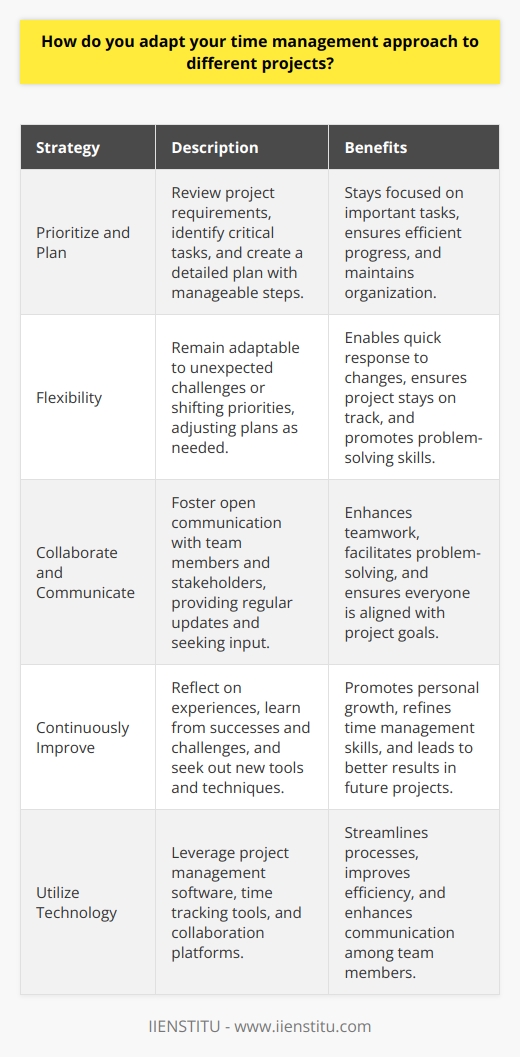
How do you handle unexpected changes in your workload?
I believe that unexpected changes in workload are a natural part of any job. When faced with sudden increases or shifts in tasks, I first take a step back and assess the situation calmly. By prioritizing the most critical and time-sensitive items, I can create a manageable action plan.
Communicate and Collaborate
Open communication with my team and supervisor is key. I proactively discuss the changes, seeking guidance and support where needed. Collaborating with colleagues can often lead to more efficient solutions and a sharing of the extra workload.
Adapt and Learn
I view unexpected changes as opportunities for growth. By embracing new challenges, I can expand my skills and adaptability. Each experience teaches me to better anticipate and handle future fluctuations in work demands.
Maintain Balance and Positivity
Throughout it all, I strive to maintain a positive attitude. Taking short breaks helps me avoid burnout and approach the work with fresh energy. I also make sure to communicate any concerns about work-life balance, as maintaining overall wellbeing is crucial for long-term productivity and job satisfaction.
In summary, I handle unexpected changes in workload through prioritization, communication, adaptability, and a focus on personal growth and balance. While such situations can be stressful, I believe approaching them with a calm, proactive mindset is the best way to overcome challenges and deliver strong results.
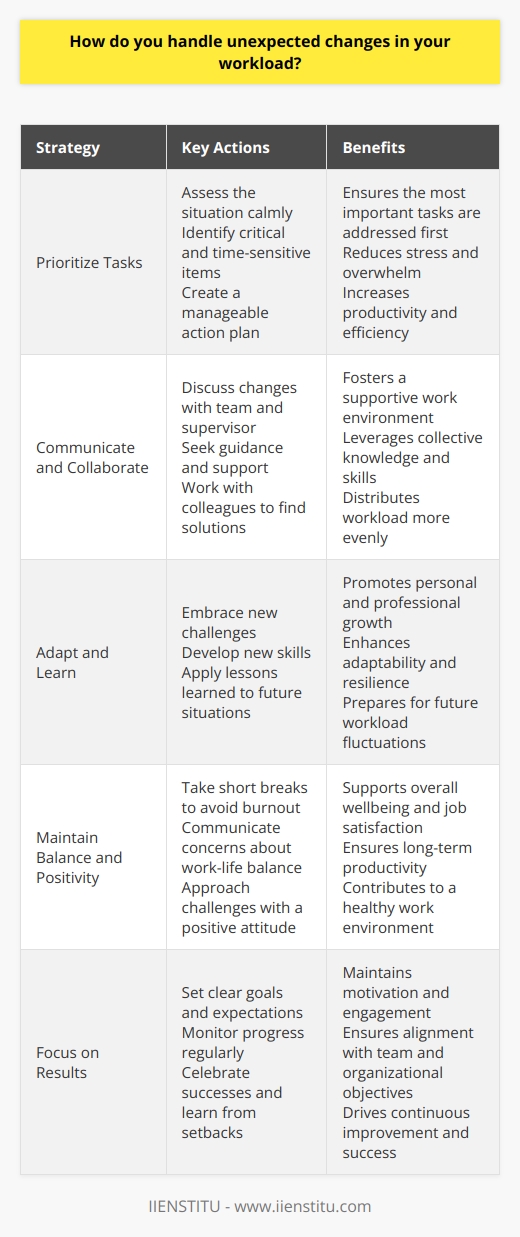
What's your approach to managing long-term projects?
When managing long-term projects, I prioritize effective communication and collaboration among team members. I believe in setting clear goals and milestones from the outset to ensure everyone is on the same page.
Breaking Down the Project
I start by breaking the project down into smaller, manageable tasks. This helps me create a realistic timeline and assign responsibilities to each team member based on their skills and strengths.
Regular Check-Ins and Updates
Throughout the project, I schedule regular check-ins with the team to discuss progress, address any challenges, and make necessary adjustments. I find that maintaining open lines of communication is key to keeping everyone motivated and on track.
Adapting to Change
I understand that unexpected obstacles can arise during long-term projects. When this happens, I remain flexible and work with the team to find creative solutions. I believe in fostering a positive and supportive work environment where everyone feels comfortable sharing ideas and concerns.
Celebrating Milestones and Success
Finally, I think it's important to celebrate milestones and successes along the way. Recognizing the team's hard work and achievements helps maintain morale and motivation throughout the project.
Overall, my approach to managing long-term projects is centered around effective communication, collaboration, and adaptability. By breaking down the project into manageable tasks, staying organized, and fostering a positive team dynamic, I've been able to successfully lead projects to completion.
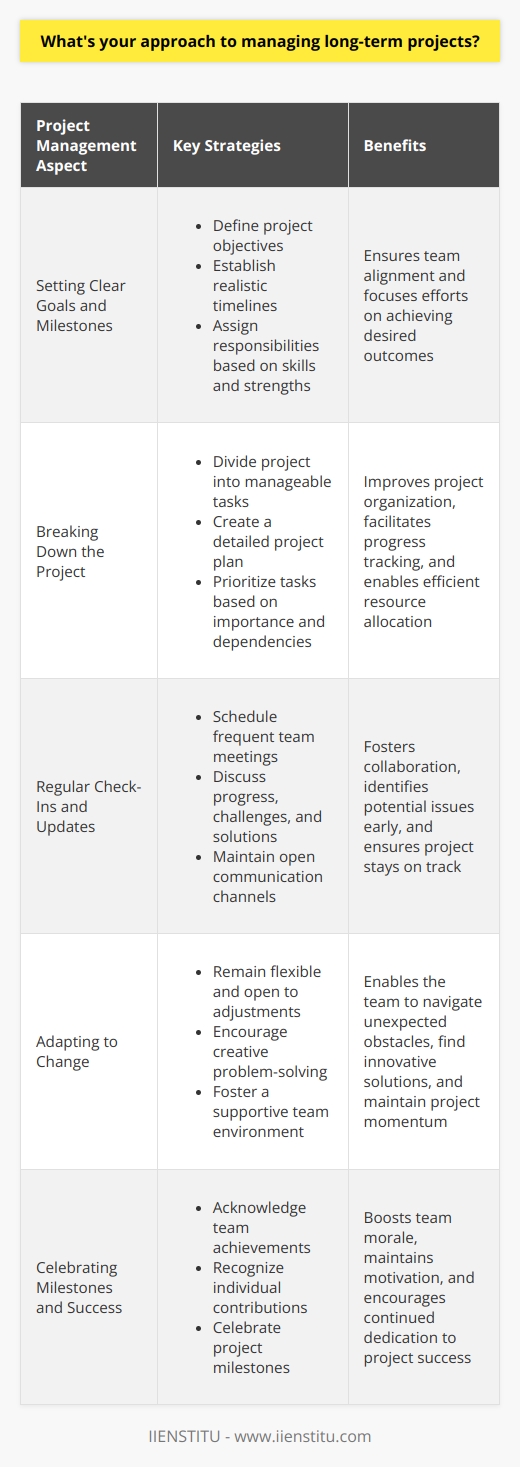
How do you ensure that you're making the best use of your time?
I ensure that I'm making the best use of my time by prioritizing my tasks effectively. Each day, I review my to-do list and identify the most critical and time-sensitive items. I tackle these high-priority tasks first, so I can make significant progress on important projects.
Effective Time Management Strategies
In addition to prioritizing, I use several other strategies to manage my time well:
Adapting to Changing Priorities
I also understand that priorities can shift unexpectedly. When this happens, I quickly reassess my to-do list and adjust my plans as needed. By staying flexible and communicating with my team, I'm able to adapt to changes without losing momentum on important work.
Focusing on High-Impact Work
Ultimately, I believe that making the best use of my time is about focusing on high-impact work. I strive to spend my time and energy on tasks that will drive results and add value. By staying strategic about where I direct my efforts, I'm able to maximize my productivity and contribute to my team's success.
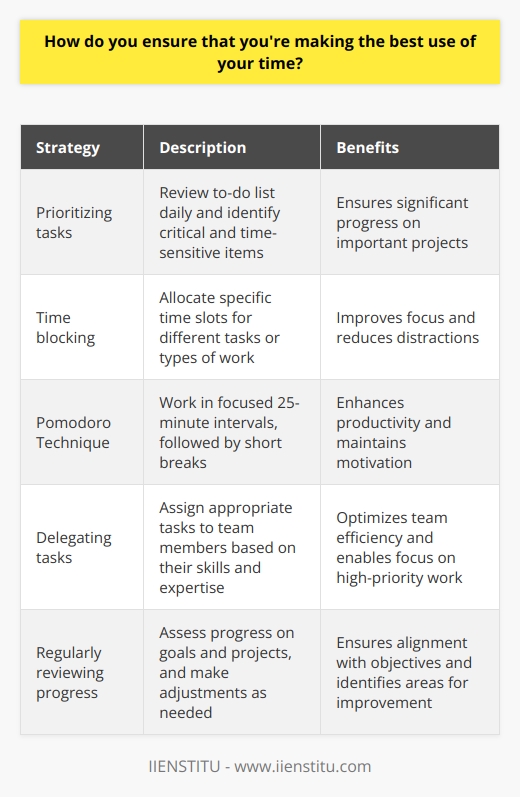
What do you do when you're feeling overwhelmed with work?
When I feel overwhelmed with work, I take a step back and prioritize my tasks. I create a list of the most important and time-sensitive items and focus on completing those first. This helps me feel more in control and reduces my stress levels.
Communicate with Your Team
I also communicate with my team and manager about my workload. I let them know if I'm struggling and ask for help or guidance when needed. Collaborating with colleagues can lighten the load and provide fresh perspectives on tackling challenges.
Take Breaks and Practice Self-Care
When the pressure feels intense, I make sure to take short breaks throughout the day. Stepping away from my desk, stretching, or doing a quick meditation helps me recharge. I also prioritize self-care outside of work, like getting enough sleep, eating well, and engaging in hobbies I enjoy. These activities boost my resilience and help me manage stress more effectively.
Focus on One Task at a Time
Multitasking can often make me feel more overwhelmed. Instead, I try to focus on one task at a time and give it my full attention. This approach allows me to work more efficiently and produce higher-quality work. I find that I feel a sense of accomplishment as I complete each task, which motivates me to keep going.
Ultimately, feeling overwhelmed is a normal part of any job. What matters most is how you respond to those feelings. By staying organized, communicating with your team, practicing self-care, and focusing on one task at a time, you can navigate even the most challenging workloads with grace and confidence.
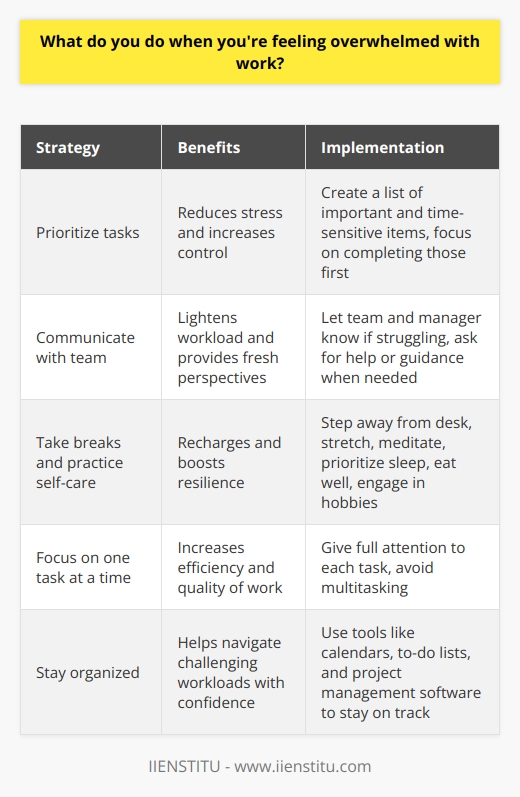
How do you prioritize your personal and professional responsibilities?
I prioritize my responsibilities based on their urgency, importance, and impact on my goals and commitments. I use a combination of tools, such as calendars, to-do lists, and project management apps, to stay organized and on track.
Assessing Urgency and Importance
When faced with competing priorities, I take a step back and assess each task's urgency and importance. Urgent tasks that have immediate consequences or deadlines take precedence over less time-sensitive matters. However, I also consider the importance of each responsibility in terms of its long-term impact on my personal and professional growth.
Balancing Work and Life
Maintaining a healthy work-life balance is crucial to my overall well-being and productivity. I set clear boundaries between my professional and personal life, dedicating specific time blocks to each. This helps me focus on the task at hand without letting one aspect of my life overwhelm the other.
Communicating and Delegating
Open communication is key to managing priorities effectively. I keep my colleagues, friends, and family informed about my commitments and any changes in my schedule. When necessary, I delegate tasks to others who have the skills and availability to assist me, ensuring that nothing falls through the cracks.
Staying Flexible and Adaptable
Despite my best efforts to plan and prioritize, unexpected challenges can arise. I remain flexible and adaptable, ready to adjust my priorities as needed. By staying calm under pressure and focusing on finding solutions rather than dwelling on problems, I can navigate even the most demanding situations with grace and effectiveness.
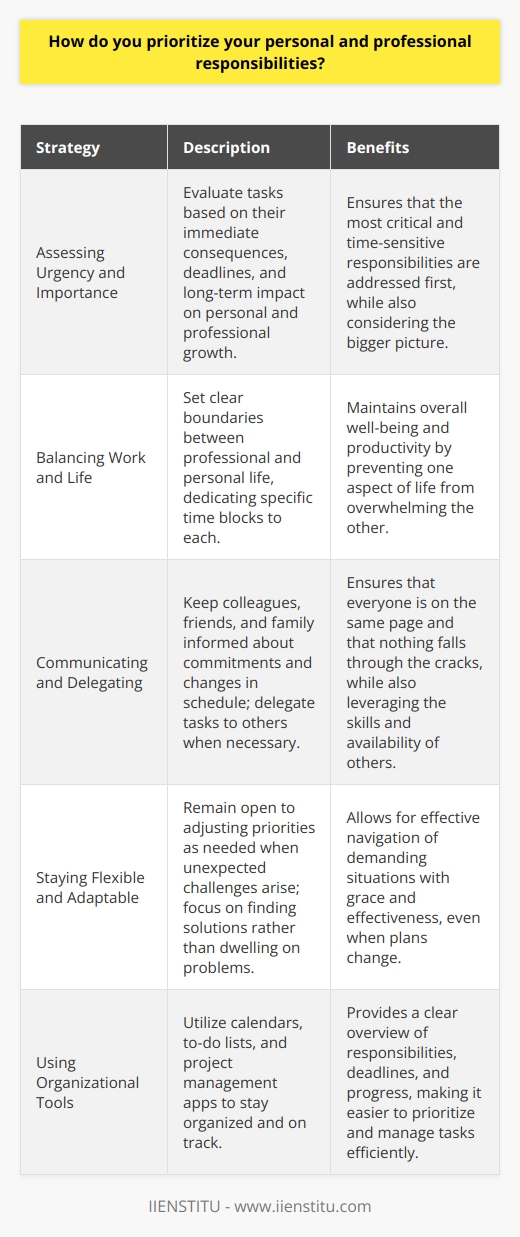
What's your strategy for managing your energy levels throughout the day?
I have a multi-pronged approach to managing my energy levels throughout the day. It starts with a healthy morning routine that sets the tone for the rest of the day.
Morning Routine
I wake up early, usually around 6am, and begin my day with some gentle stretches and deep breathing exercises. This helps to activate my body and clear my mind. I then make myself a nutritious breakfast, typically oatmeal with fresh berries and a cup of green tea.
Prioritizing Tasks
At work, I prioritize my tasks based on their importance and urgency. I tackle the most challenging tasks when my energy levels are at their peak, usually in the morning. I break larger projects into smaller, manageable chunks to avoid feeling overwhelmed.
Taking Breaks
I make sure to take regular breaks throughout the day, even if it's just for a few minutes. I'll step away from my desk, stretch my legs, and maybe chat with a colleague. These short breaks help me recharge and refocus.
Staying Hydrated and Nourished
I always keep a water bottle at my desk and sip on it regularly. Staying hydrated is crucial for maintaining energy levels. I also make sure to have healthy snacks on hand, like nuts or fresh fruit, to keep my blood sugar levels stable.
Mindfulness and Stress Management
When I feel my energy starting to dip, I take a moment to practice mindfulness. I focus on my breathing and try to let go of any tension or stress. If I'm feeling particularly overwhelmed, I might take a quick walk outside to clear my head.
By implementing these strategies, I'm able to maintain steady energy levels throughout the day and stay productive.
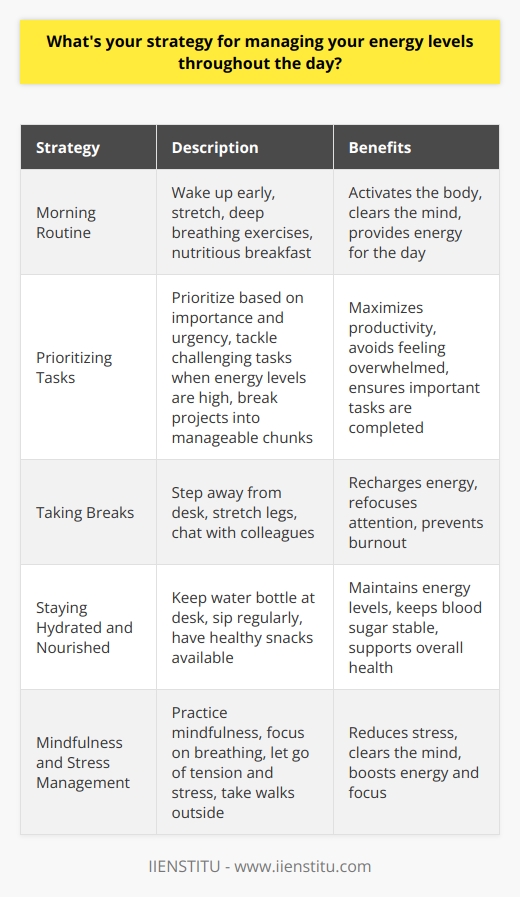
How do you handle procrastination?
I believe that procrastination is a challenge that everyone faces at some point in their lives. When I find myself putting off important tasks, I take a step back and try to understand the underlying reasons for my hesitation.
Identifying the Root Cause
Is it because I'm feeling overwhelmed or uncertain about how to proceed? Or maybe I'm simply not in the right frame of mind to tackle the task at hand. Once I've pinpointed the source of my procrastination, I can develop a plan to overcome it.
Breaking Tasks into Manageable Steps
One strategy that has worked well for me is breaking large projects into smaller, more manageable steps. By focusing on one piece at a time, I feel less intimidated and more motivated to make progress.
Setting Deadlines and Rewards
I also find that setting personal deadlines and rewarding myself for meeting them can be effective. Even something as simple as promising myself a favorite snack or a short break after completing a certain amount of work can give me the push I need to stay on track.
Seeking Support and Accountability
Finally, I've learned that it's okay to ask for help when I'm struggling with procrastination. Whether it's reaching out to a colleague for advice or simply sharing my goals with a friend to hold myself accountable, having a support system can make all the difference.
At the end of the day, procrastination is a hurdle that can be overcome with the right mindset and strategies. By taking a proactive approach and being kind to myself in the process, I've been able to consistently meet my goals and deliver high-quality work.
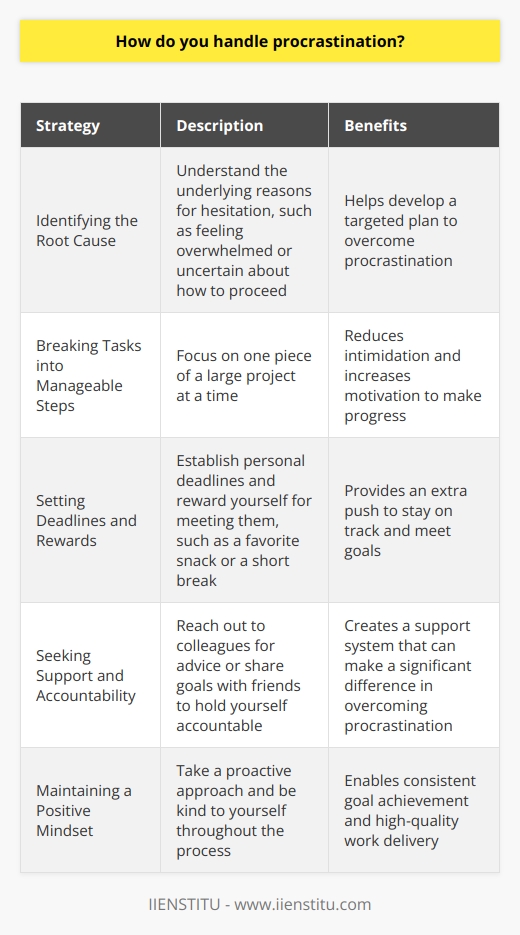
What do you do when you're faced with a particularly challenging task?
When faced with a challenging task, I approach it with a positive attitude and a problem-solving mindset. I break the task down into smaller, manageable steps to make it less overwhelming. This helps me focus on one part at a time and make steady progress.
Leveraging Resources and Collaboration
I'm not afraid to ask for help or guidance when needed. I leverage the knowledge and expertise of my colleagues, mentors, or supervisors. Collaborating with others can provide fresh perspectives and ideas that I might not have considered on my own.
Embracing Challenges as Opportunities
I view challenging tasks as opportunities for growth and learning. Even if I encounter obstacles or setbacks, I remain persistent and adaptable. I learn from my mistakes and use them as stepping stones to improve my skills and approach.
Staying Organized and Focused
To tackle challenging tasks effectively, I stay organized and focused. I prioritize my workload, set realistic goals, and create a timeline. By staying on top of my responsibilities and managing my time well, I can dedicate the necessary effort to the challenging task at hand.
Celebrating Milestones and Successes
I believe in celebrating milestones and successes along the way. Recognizing the progress I've made, no matter how small, keeps me motivated and energized. It reminds me that I'm capable of overcoming challenges and achieving my goals.
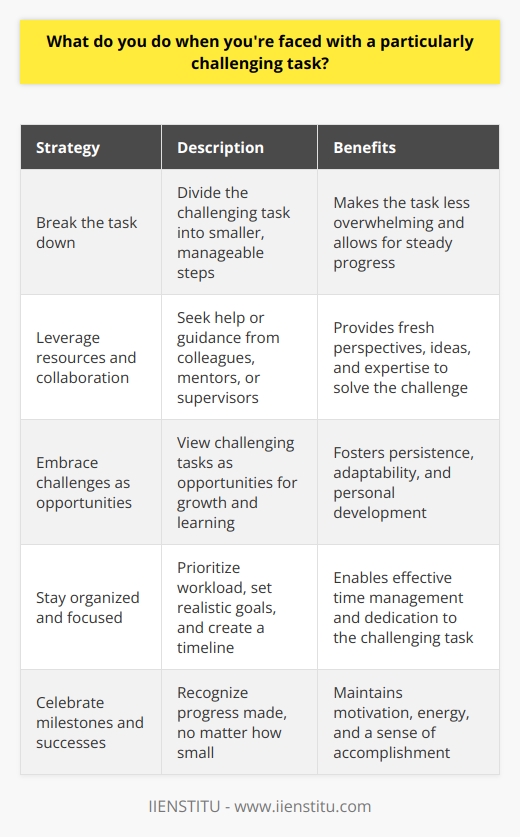
How do you ensure that you're taking enough breaks?
I ensure that I'm taking enough breaks by setting reminders on my phone or computer throughout the day. These reminders prompt me to step away from my desk and stretch, grab a snack, or just rest my eyes for a few minutes. I also make it a point to take a proper lunch break, even if it's just for 20-30 minutes, to recharge and refocus.
Listening to My Body
Another way I make sure I'm taking enough breaks is by listening to my body. If I feel myself getting tired, stressed, or losing focus, I know it's time for a break. I might take a quick walk around the office, do some deep breathing exercises, or chat with a coworker for a few minutes. These small breaks help me maintain my energy and productivity throughout the day.
Prioritizing Self-Care
In addition to taking breaks during the workday, I also prioritize self-care outside of work. This means getting enough sleep, eating well, and engaging in hobbies and activities that bring me joy and relaxation. When I take care of myself holistically, I find that I'm better able to manage stress and maintain a healthy work-life balance.
Communicating with My Team
Finally, I believe in open communication with my team and managers about workload and expectations. If I'm feeling overwhelmed or burned out, I'm not afraid to speak up and ask for support or adjustments to my workload. By being proactive and honest about my needs, I can ensure that I'm taking the necessary breaks to do my best work.
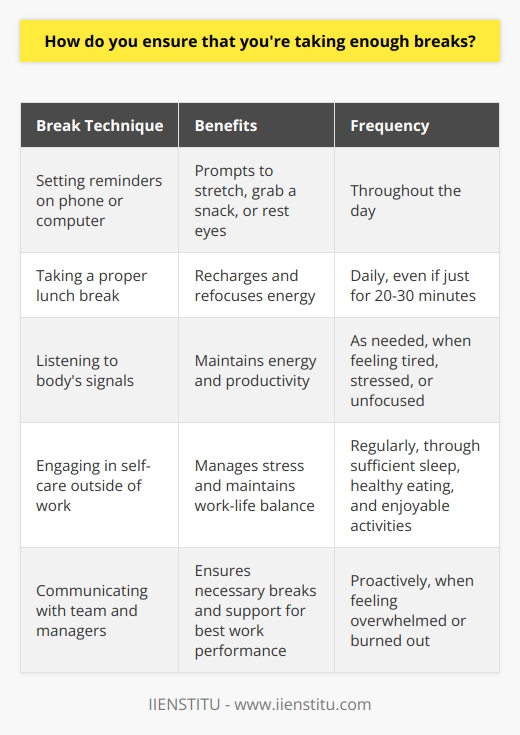
What's your approach to managing your email inbox?
When it comes to managing my email inbox, I have a systematic approach that keeps me organized and efficient. Over the years, I've developed a few key strategies that help me stay on top of my emails.
Prioritizing Important Messages
First, I prioritize messages based on their urgency and importance. I quickly scan through my inbox and flag any emails that require immediate attention. This ensures that I don't miss any critical communications and can respond in a timely manner.
Utilizing Folders and Labels
Next, I utilize folders and labels to categorize my emails. I have separate folders for different projects, clients, and topics. This makes it easy for me to find specific emails when I need them and keeps my inbox clutter-free.
Setting Aside Dedicated Email Time
I also set aside dedicated time each day to focus solely on emails. During these blocks of time, I go through my inbox methodically, responding to messages, filing them away, or deleting them as needed. This helps me avoid constantly checking my email throughout the day, which can be a major distraction.
Unsubscribing from Unnecessary Emails
Finally, I regularly unsubscribe from newsletters or promotional emails that I no longer find relevant or useful. This cuts down on the volume of emails I receive and allows me to focus on the messages that truly matter.
By implementing these strategies, I'm able to effectively manage my email inbox and ensure that nothing falls through the cracks. It's a system that has served me well in both my personal and professional life, and I'm confident it will continue to do so in this role.
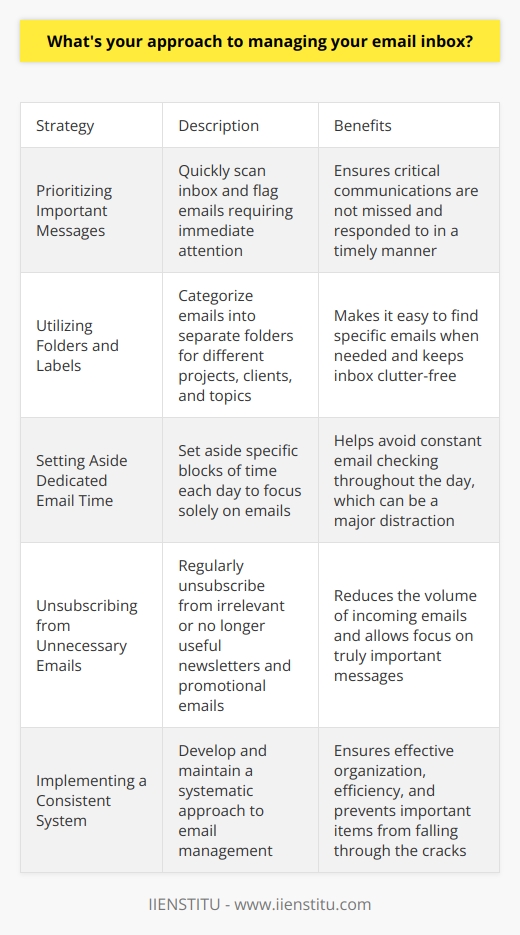
How do you handle meetings and other time-consuming activities?
When it comes to meetings and time-consuming activities, I have a few strategies that help me stay productive and efficient.
Prioritize and Plan Ahead
I always make sure to prioritize my tasks and plan ahead for meetings. This helps me stay focused and prepared. Before each meeting, I review the agenda and any relevant materials so I can contribute effectively.
Be Engaged and Participative
During meetings, I actively listen and participate in discussions. I share my ideas, ask questions, and provide feedback when appropriate. By being engaged, I help move the meeting forward and ensure everyone's time is well-spent.
Take Notes and Follow Up
I always take notes during meetings to capture key points, action items, and decisions. After the meeting, I review my notes and follow up on any tasks or next steps in a timely manner. This helps keep projects moving forward and shows my commitment to the team.
Manage Time Wisely
Outside of meetings, I'm proactive about managing my time. I break larger projects into smaller, manageable tasks and set deadlines for myself. I also minimize distractions by closing my email and putting my phone on silent when I need to focus.
Communicate and Collaborate
Finally, I believe effective communication and collaboration are key to making the most of everyone's time. I keep my team updated on my progress, ask for help when I need it, and offer my assistance to others whenever possible. By working together efficiently, we can accomplish great things without wasting time.
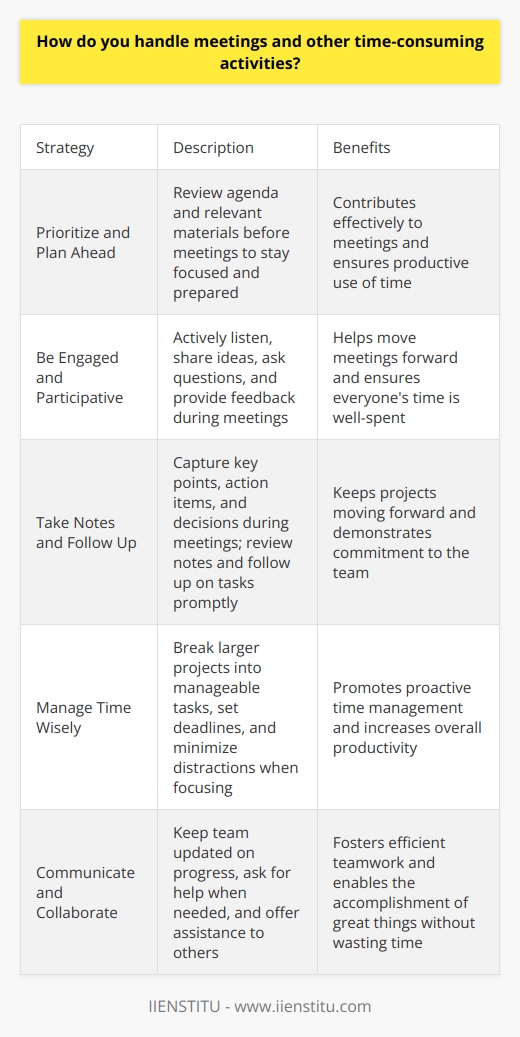
What do you do when you're feeling stuck or uninspired?
When I'm feeling stuck or uninspired, I have a few go-to strategies that help me get back on track. First, I try to step away from the problem for a bit and do something completely different. This could be taking a quick walk outside, chatting with a coworker, or even just making a cup of tea.
Change Your Environment
Sometimes a change of scenery is all it takes to jumpstart my creativity. If I'm able to, I'll work from a different location for a few hours, like a coffee shop or even just a different room in the office. The new environment can provide fresh perspective and help me see things from a different angle.
Talk It Out
If I'm really struggling, I find it helpful to talk through the problem with someone else. Bouncing ideas off a colleague or even just explaining my thought process out loud can help me identify areas where I'm getting hung up and brainstorm new approaches.
Break It Down
When a project feels overwhelming, I try breaking it down into smaller, more manageable tasks. Tackling things step-by-step makes it feel less daunting and helps me build momentum as I check items off my list.
Stay Positive
Above all, I try to stay positive and remind myself that feeling stuck is a normal part of the creative process. Every challenge is an opportunity to learn and grow, and I know that with a little patience and persistence, I'll be able to work through it and come out even stronger on the other side.
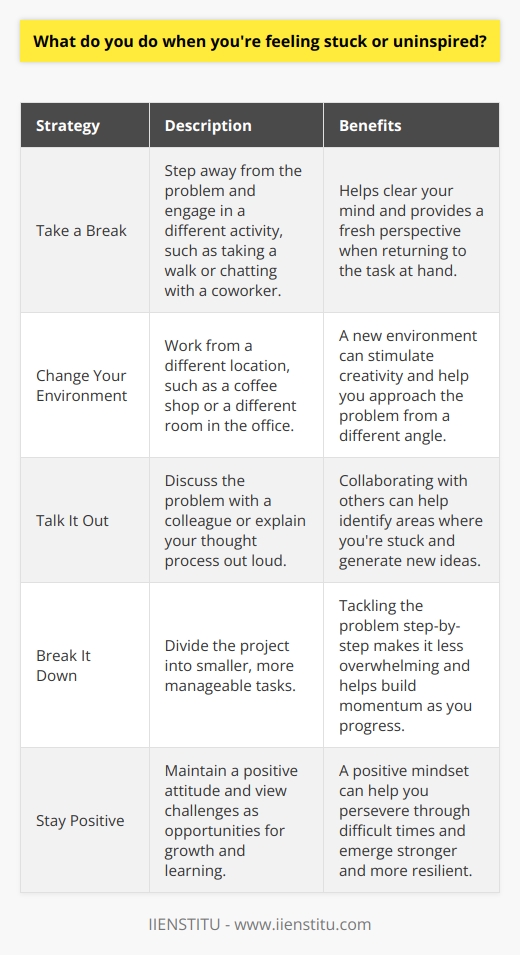
How do you ensure that you're making progress on your long-term goals?
I ensure progress on my long-term goals by breaking them down into smaller, actionable steps. This makes the goals more manageable and less overwhelming.
Set Clear Milestones
I set clear milestones for each goal, which helps me track my progress and stay motivated. Celebrating small wins along the way keeps me engaged and driven.
Regular Check-Ins
I schedule regular check-ins with myself to assess my progress and make adjustments as needed. This helps me stay accountable and identify areas where I may need to focus more attention.
Prioritize and Adapt
I prioritize my goals based on their importance and urgency. If circumstances change, I adapt my plan accordingly. Flexibility is key to staying on track and making consistent progress.
Learn from Setbacks
When I encounter setbacks, I try to learn from them and use that knowledge to inform my future actions. I don't let temporary failures discourage me; instead, I view them as opportunities for growth.
By following these strategies, I'm able to make steady progress toward my long-term goals while maintaining a healthy work-life balance. It's not always easy, but the sense of accomplishment I feel when I reach a milestone makes it all worthwhile.
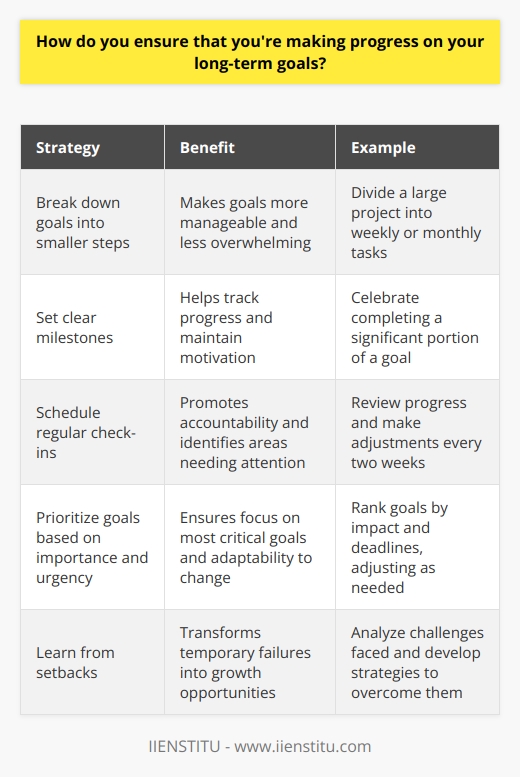
What's your strategy for managing your stress levels?
When it comes to managing stress levels, I have a few key strategies that I rely on. First and foremost, I prioritize regular exercise and physical activity. Whether it's going for a run, hitting the gym, or simply taking a brisk walk during my lunch break, I find that moving my body helps to clear my mind and reduce stress.
Mindfulness and Meditation
In addition to exercise, I also practice mindfulness and meditation. Taking a few minutes each day to sit quietly, focus on my breath, and let go of any racing thoughts or worries can make a big difference in my overall stress levels. I've found that apps like Headspace and Calm are great resources for guided meditations.
Time Management and Prioritization
Another important aspect of stress management for me is effective time management and prioritization. I try to break down my tasks into manageable chunks, tackle the most important and time-sensitive items first, and avoid procrastination. Using tools like a planner or a productivity app helps me stay organized and on top of my responsibilities.
Work-Life Balance
Maintaining a healthy work-life balance is also crucial for managing stress. I make sure to set boundaries between my work and personal life, carving out time for hobbies, socializing with friends and family, and simply relaxing and recharging. It's important to remember that there's more to life than just work!
Communication and Support
Finally, I believe in the power of communication and seeking support when needed. If I'm feeling overwhelmed or stressed, I don't hesitate to reach out to my colleagues, supervisor, or even a trusted friend or family member. Sometimes just talking through my concerns and getting a fresh perspective can help alleviate stress.
By incorporating these strategies into my daily routine, I've found that I'm better equipped to handle the inevitable stresses that come with any job. It's an ongoing process, but I'm committed to prioritizing my well-being and maintaining a healthy, balanced approach to work and life.
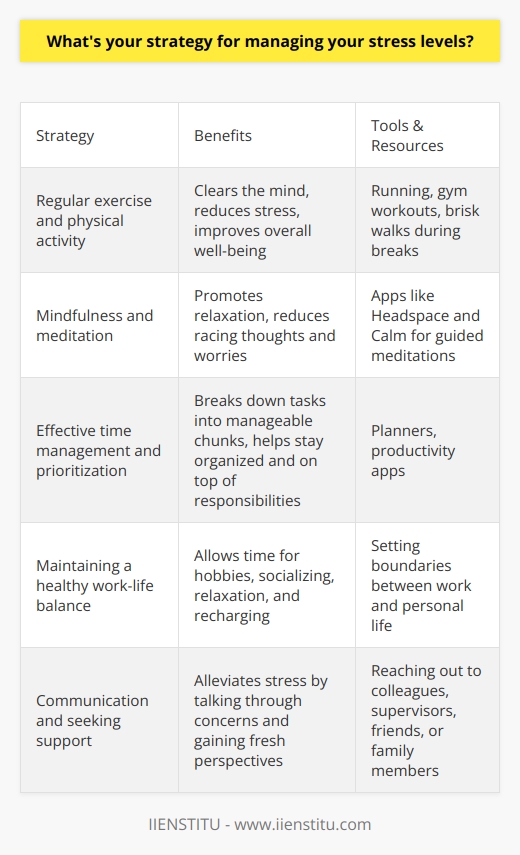
How do you handle tasks that you don't enjoy?
When faced with tasks that I don't particularly enjoy, I try to approach them with a positive mindset. I remind myself that every job has its challenges, and it's important to tackle them head-on. Here are a few strategies I use to handle less enjoyable tasks:
Break It Down
I find that breaking a task down into smaller, manageable steps makes it less daunting. By focusing on one step at a time, I can make steady progress without feeling overwhelmed. This approach helps me stay motivated and reduces procrastination.
Find the Purpose
I try to understand the purpose behind the task and how it contributes to the overall goals of the company. When I see the bigger picture, it becomes easier to appreciate the importance of the task, even if it's not my favorite thing to do. Knowing that my effort makes a difference keeps me engaged and motivated.
Seek Opportunities for Growth
I view less enjoyable tasks as opportunities for personal and professional growth. By stepping out of my comfort zone and tackling new challenges, I can develop new skills and expand my knowledge. This mindset helps me approach the task with a sense of curiosity and enthusiasm.
Collaborate and Communicate
If I'm struggling with a task, I don't hesitate to reach out to my colleagues for support and guidance. Collaborating with others can bring fresh perspectives and make the task more enjoyable. Open communication with my supervisor is also crucial to ensure that I'm meeting expectations and addressing any concerns.
Reward Myself
I believe in celebrating small victories. After completing a less enjoyable task, I take a moment to acknowledge my accomplishment and reward myself in some way. It could be as simple as taking a short break or treating myself to a favorite snack. These small rewards keep me motivated and help me maintain a positive attitude.
In summary, handling tasks that I don't enjoy requires a combination of mindset, strategy, and self-motivation. By breaking them down, finding purpose, seeking growth opportunities, collaborating with others, and rewarding myself, I can tackle even the most challenging tasks with a sense of professionalism and determination.
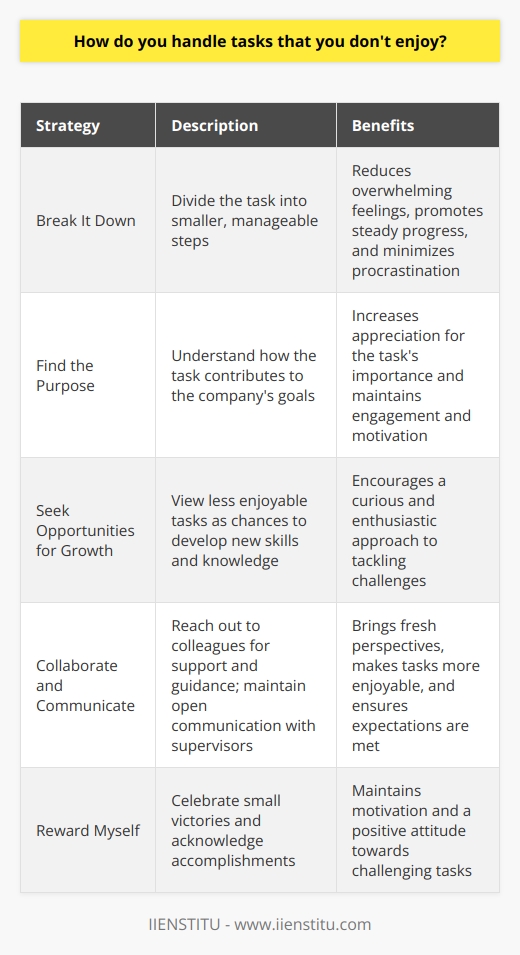
What do you do when you're faced with a tight deadline?
When faced with a tight deadline, I prioritize tasks and break them down into manageable steps. I focus on the most critical aspects first and ensure that I have a clear understanding of the project requirements.
Effective Time Management
I create a detailed timeline and allocate specific time slots for each task. This helps me stay organized and on track. I also eliminate any distractions and give my full attention to the project at hand.
Collaboration and Communication
If I'm working with a team, I make sure to communicate regularly and effectively. We share progress updates, discuss any challenges, and brainstorm solutions together. Collaboration is key to meeting tight deadlines.
Staying Calm Under Pressure
I've learned to stay calm and focused under pressure. Taking deep breaths and maintaining a positive attitude helps me think clearly and make better decisions. I remind myself that I have the skills and experience to handle the situation.
Learning from Experience
After completing a project under a tight deadline, I take time to reflect on the experience. I identify what worked well and what I could improve for next time. This helps me continuously enhance my time management and problem-solving skills.
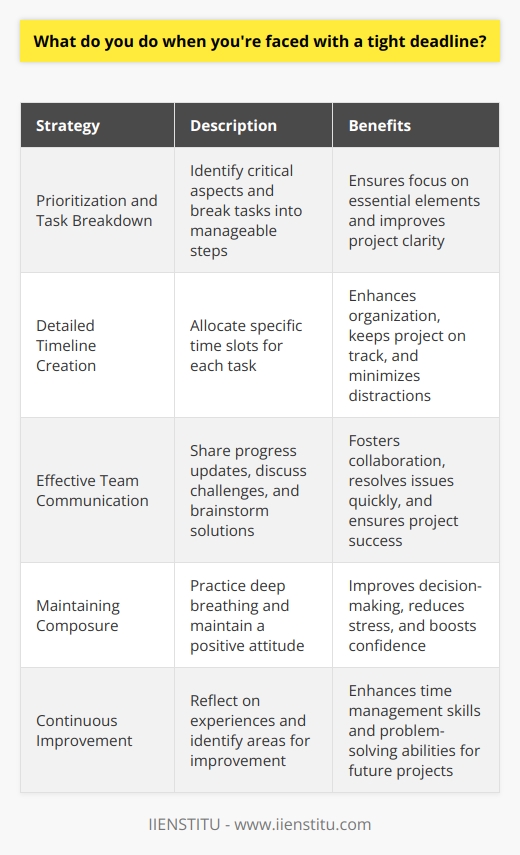
How do you ensure that you're communicating effectively with your team?
I believe that effective communication is the foundation of any successful team. I always strive to be clear and concise in my communications, whether it's through email, instant messaging, or face-to-face conversations. I've found that being direct and avoiding jargon helps ensure that everyone is on the same page.
Active Listening
One of the keys to effective communication is being an active listener. I make a point to give my full attention to whoever is speaking and ask clarifying questions if needed. This helps me understand their perspective and ensures that I'm not making assumptions.
Regular Check-Ins
I also believe in the importance of regular check-ins with my team members. Whether it's a quick stand-up meeting or a more in-depth one-on-one, these check-ins provide an opportunity to align on priorities, address any concerns, and ensure that everyone feels heard and supported.
Adapting Communication Style
Another important aspect of effective communication is being able to adapt my communication style to fit the needs and preferences of my team members. Some people prefer detailed explanations, while others appreciate a more high-level overview. By taking the time to understand each person's communication style, I can tailor my approach to ensure that everyone is getting the information they need in a way that works for them.
Encouraging Open Dialogue
Finally, I believe in fostering an environment of open dialogue and feedback. I encourage my team members to speak up if they have questions, concerns, or ideas, and I make a point to actively seek out their input. By creating a culture of transparency and collaboration, I've found that we're able to work more effectively as a team and achieve better results.
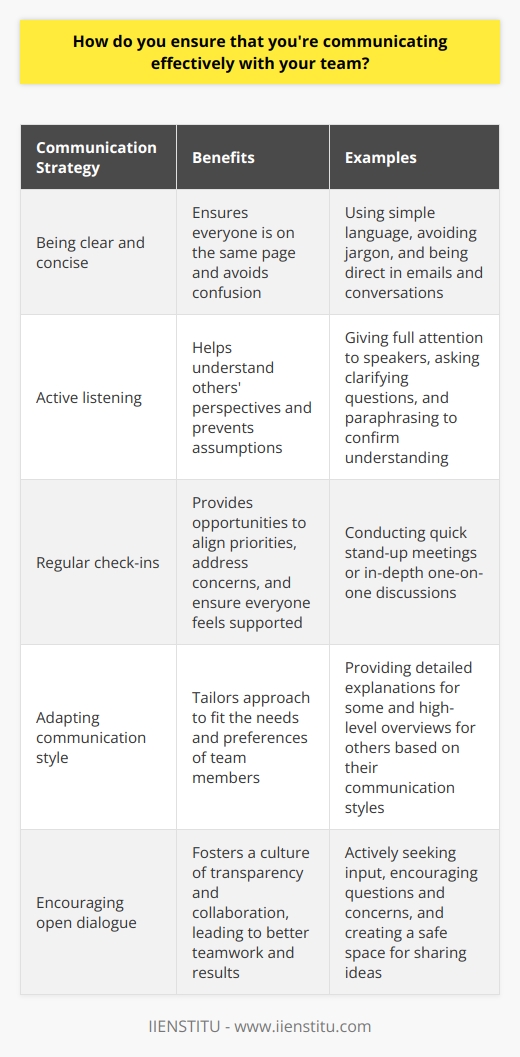
What's your approach to managing your work-life balance?
I believe that maintaining a healthy work-life balance is crucial for both personal well-being and professional success. I strive to prioritize my tasks effectively, focusing on the most important and time-sensitive responsibilities first. This helps me manage my workload efficiently and avoid unnecessary stress.
Setting Boundaries and Disconnecting
I set clear boundaries between my work and personal life. When I'm at work, I give my full attention and effort to my job duties. However, once I leave the office or log off for the day, I make a conscious effort to disconnect from work-related matters. This allows me to recharge, pursue personal interests, and spend quality time with loved ones.
Effective Time Management
I'm a strong believer in effective time management. I use tools like calendars, to-do lists, and productivity apps to organize my tasks and deadlines. By breaking down larger projects into smaller, manageable steps, I can tackle them more efficiently and avoid feeling overwhelmed. I also make sure to allocate dedicated time slots for focused work, minimizing distractions and maximizing productivity.
Flexibility and Adaptability
I understand that unexpected challenges and changes can arise both at work and in personal life. I remain flexible and adaptable, ready to adjust my plans when necessary. If I need to put in extra hours to meet a critical deadline, I do so willingly. However, I also make sure to compensate for that time later by taking some personal time off to maintain balance.
Prioritizing Self-Care and Well-being
I recognize that taking care of myself is essential for maintaining a healthy work-life balance. I make time for regular exercise, whether it's hitting the gym or going for a run in the park. I also prioritize getting enough sleep, eating a balanced diet, and engaging in hobbies and activities that bring me joy and relaxation. By taking care of my physical and mental well-being, I'm better equipped to handle the demands of both my professional and personal life.
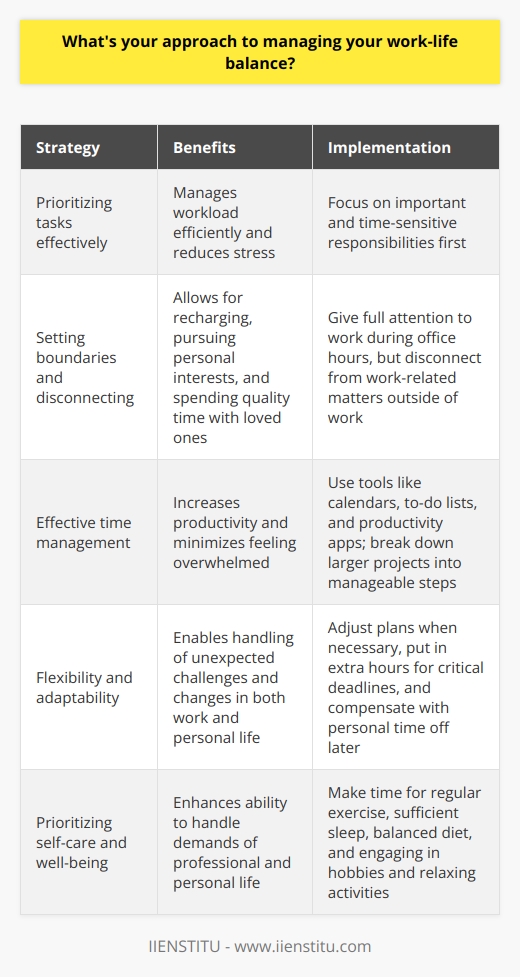
How do you handle tasks that require a lot of focus and concentration?
When faced with tasks that require intense focus and concentration, I have a few strategies that help me stay on track. First and foremost, I eliminate any potential distractions like silencing my phone or closing unnecessary browser tabs. This allows me to fully immerse myself in the task at hand without interruptions.
Breaking Tasks into Manageable Chunks
If the task is particularly complex or time-consuming, I break it down into smaller, more manageable steps. By tackling the project piece by piece, it feels less overwhelming and I can maintain my concentration for longer periods. I also find that setting mini-deadlines for each chunk helps keep me motivated and focused.
Taking Strategic Breaks
While it may seem counterintuitive, taking short breaks can actually boost focus and productivity. When I feel my concentration starting to wane, I step away from the task for a few minutes to stretch, grab a snack, or do some deep breathing exercises. These brief mental and physical breaks help recharge my brain so I can dive back in with renewed energy and clarity.
Creating the Right Environment
I've found that my surroundings play a big role in my ability to focus. Whenever possible, I try to work in a quiet, clutter-free space with good lighting and comfortable seating. If I'm working from home, I'll even light a candle or put on some instrumental music to create a calming atmosphere that helps me concentrate.
At the end of the day, handling tasks that require intense focus is all about knowing yourself and what works best for you. By implementing these strategies and staying in tune with my own needs, I'm able to tackle even the most demanding projects with confidence and efficiency.
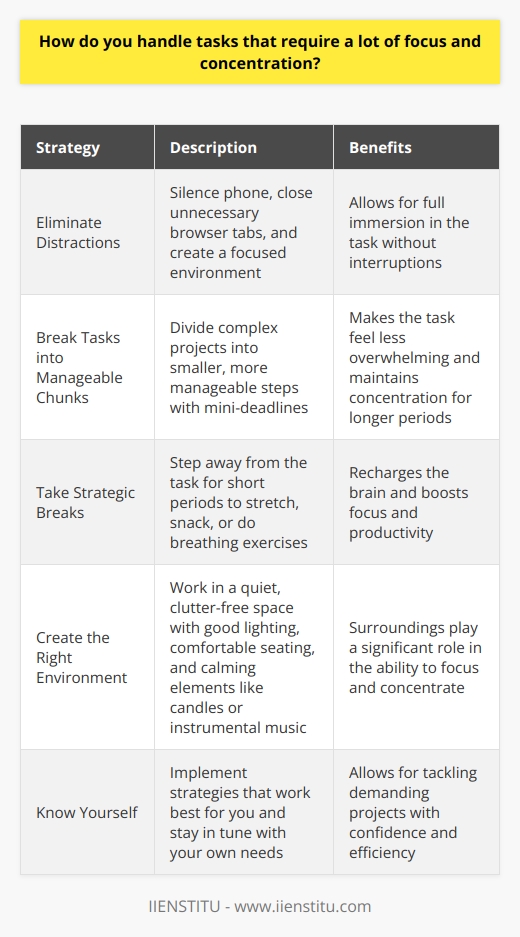
What do you do when you're feeling unproductive?
When I'm feeling unproductive, I first take a step back and try to identify the root cause. Sometimes it's because I'm tired or stressed, so I'll take a short break to recharge. Other times, I might be stuck on a particular task or problem.
Strategies for Overcoming Unproductivity
Break Tasks into Smaller Steps
If a project feels overwhelming, I break it down into more manageable pieces. Tackling bite-sized tasks helps build momentum and a sense of progress.
Change Up My Environment
A change of scenery can work wonders. I might take my laptop to a coffee shop or find a quiet spot outdoors. The fresh surroundings often give me a new perspective and renewed focus.
Collaborate with Others
Bouncing ideas off colleagues or brainstorming with my team can get the creative juices flowing again. Their input and energy reignite my own motivation.
The Importance of Self-Care
I've learned that taking care of myself is key to maintaining productivity. When I'm well-rested, nourished, and have a clear mind, I'm far more efficient and effective in my work. So if I'm having an unproductive day, I prioritize things like eating a healthy meal, going for a quick jog, or practicing mindfulness to recenter myself.
At the end of the day, we all have unproductive moments. The key is developing strategies to navigate through them and get back on track. It's an ongoing process, but with self-awareness and proactive approaches, I'm able to minimize unproductive periods and consistently deliver my best work.
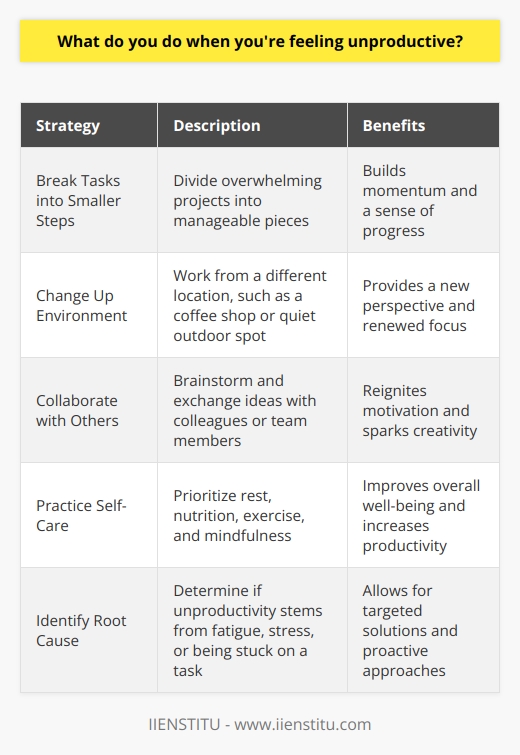
How do you ensure that you're always learning and growing in your role?
I ensure that I'm always learning and growing in my role by actively seeking out new challenges and opportunities. Whenever I encounter a problem or task that I'm unfamiliar with, I dive in head-first and try to figure it out. I'm not afraid to ask questions or seek guidance from my colleagues when needed.
Continuous Learning
I believe that continuous learning is essential for personal and professional growth. I make it a point to attend industry conferences, workshops, and seminars whenever possible. These events expose me to new ideas, trends, and best practices in my field. I also take online courses and read books related to my job to expand my knowledge and skills.
Seeking Feedback
Another way I ensure that I'm growing is by actively seeking feedback from my managers and peers. I welcome constructive criticism and use it as an opportunity to identify areas where I can improve. I also make sure to thank people for their feedback and let them know how I plan to implement their suggestions.
Taking Initiative
I'm always looking for ways to contribute more to my team and the company. When I see a problem or opportunity, I don't wait for someone else to address it. I take initiative and come up with ideas and solutions. Even if my ideas aren't always implemented, I believe that taking initiative shows my commitment to growth and improvement.
In my previous role, I noticed that our team was struggling with a particular process. I researched different solutions and presented my findings to my manager. We ended up implementing one of my suggestions, which streamlined the process and saved the team a lot of time and effort. It was a great learning experience for me and showed me the value of taking initiative.
